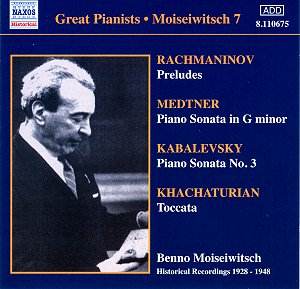This disc is a gift. For only a fiver, here is
some sovereign pianism of the old school in excellent sound restoration
by Ward Marston. True, collectors may find they are replicating
some of Philips 456 907-2 (Great Pianists of the Twentieth Century),
which includes the Kabalevsky and Medtner Sonatas. But the rewards
here are great, and for those new to Moiseiwitsch’s art (and it
really is art), it is difficult to think of a better introduction.
Naxos’s seventh volume of Moiseiwitsch recordings centres on Russian
composers who straddled the nineteenth and twentieth centuries.
Moiseiwitsch was actually a friend of Rachmaninov
as well as one of his most powerful exponents. Moiseiwitsch’s
Rachmaninov has always enjoyed the best of reputations. It is
rooted in an unimpeachable integrity. Emotional outpourings, never
undersold, are nevertheless subsumed within a certain distancing
that shows relevant the work as a coherent entity. Part of this
‘distancing’ impression comes from Moiseiwitsch’s pedal work.
In the best tradition of Russian pianists (born in Odessa and
a pupil of Leschetizky), he is more sparing than more Western
European counterparts in this department, allowing counterpoint
and subsidiary voices to speak with the utmost clarity. Even the
now-hackneyed C sharp minor Prelude (Op. 3 No. 2) emerges as a
truly magisterial utterance. It is impressive, certainly. Interesting
it is placed second on the disc: it emerges as the logical outcome
of the account of the E minor Moment musical from Op. 16.
This latter is amazingly smooth, full of the contained power that
lies at the heart of Rachmaninov.
Interesting, too, that Naxos give the listener
the chance to compare two performances of the B minor Prelude
(Op. 32 No. 10), recorded a mere two months apart. The first was
issued only on Victor. Chords are superbly together, carefully
placed and punctuating the quietly rocking figure. The build-up
in the middle section is most carefully graduated. The slightly
later performance is a little more impetuous. Both have much to
recommend them: possibly the preference will lie in the listener’s
mood at the time.
The highlight of the Rachmaninov group, without
doubt, is the G major Prelude, Op. 32 No. 5. This seemingly Anglo-Russian
idyll is caught on the wing. Filigree decorations are without
parallel, trills miraculous. The coda (the composer’s debt to
Chopin made clear here) is wonderfully affecting. Recorded at
Abbey Road Studio No. 3 on October 19th, 1943, this
must have been quite a day. From the same session comes a flowing
G sharp minor Prelude (Op. 32 No. 12), the close of which is timed
to perfection. It seems entirely fitting that the Rachmaninov
group closes with Lilacs, in an incredibly tender performance
that highlights Moiseiwitsch’s sensitivity.
The composer Nikolai Medtner was incredibly lucky
in the pianists who chose to champion his music. Gilels was one;
here Moiseiwitsch’s principal offering is the G minor Sonata,
Op. 22. Moiseiwitsch presents the Sonata as a fine work in its
own right, rather than as a Russified Brahms. Tremendous sweep
is married to a remarkable clarity of texture, even when the writing
becomes fairly convoluted. Medtner referred to the second movement
as ‘Interludium’, yet it becomes far more than this under Moiseiwitsch’s
fingers. The sonata concludes with an Allegro assai in which one
feels one is in the presence of total interpretative security.
It is one of those occasions where, whilst one may be aware that
other approaches may be valid, when one listens there is no space
for any other interpretation. This Sonata alone is worth the price
of the disc.
The two Fairy Tales and the Round Dance
(in which Moiseiwitsch is joined by the composer himself!) are
more than encores. There is much delightful fantasy here. The
Round Dance is more playful, more angular, than the other
pieces, the harmonies nice and pungent. In many ways this six-minute
piece acts as the crowning glory of the Medtner section of the
disc as well as representing a valuable historical document in
its own right.
Kabalevsky’s Third Sonata is a delight. Moiseiwitsch
superbly captures the bitter-sweet quality of this essentially
harmless music. The way he melts back into the restatement of
the opening at 3’47 is pure magic. The ‘cantabile’ part of the
slow movements marking is aurally obvious: Moiseiwitsch makes
the listener more than aware of the vocal potentialities of the
melodic lines. The finale is something of a miracle in that Moiseiwitsch
injects something into music that in lesser hands could degenerate
into the banal. Instead, there is a piquant spikiness that will
not fail to raise a smile.
As with the Medtner, the Sonata is effectively
followed by a trio of encores. Different composers, this time,
though. The Prokofiev Suggestion diabolique represents
supreme piano playing, even if it could be incarnated more violently
in other hands; the Khachaturian Toccata has tremendous
passion while the Sabre Dance (say this composer’s name,
it shall appear!) is all of the romp it should be.
Unhesitatingly recommended.
Colin Clarke


